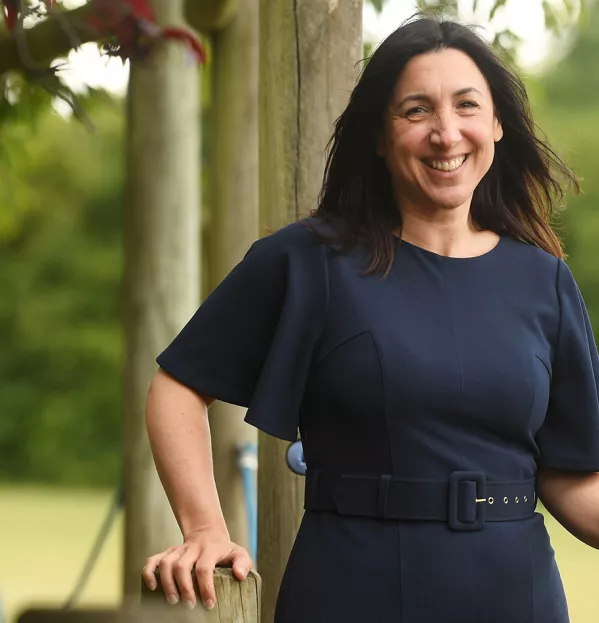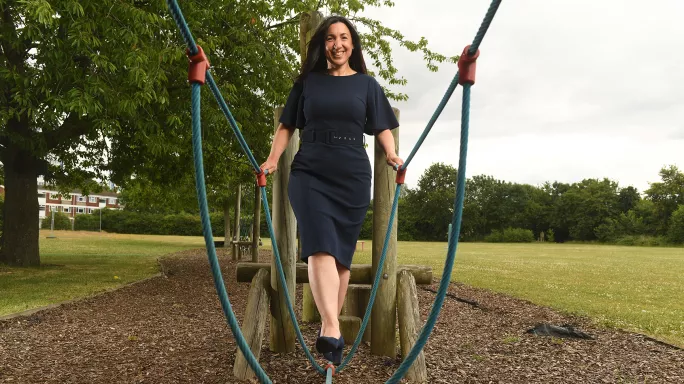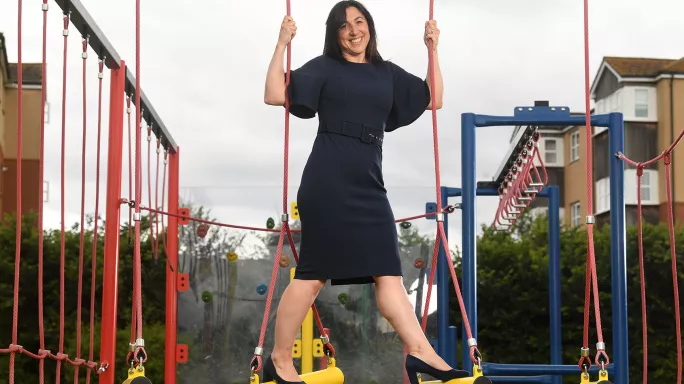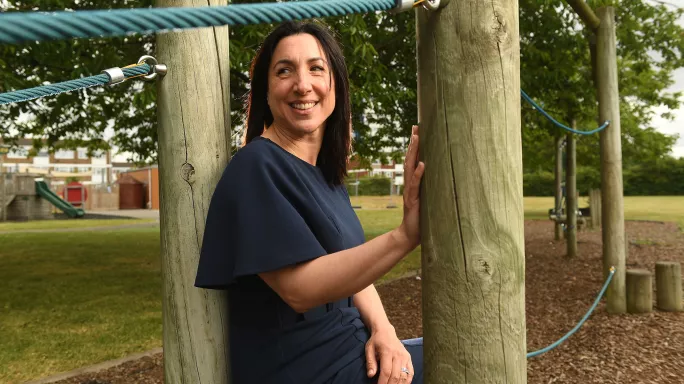- Home
- Leadership
- Strategy
- 10 questions with...Antonia Spinks
10 questions with...Antonia Spinks

Antonia Spinks is chief executive of Pioneer Educational Trust, which runs four schools - a primary, middle and two secondaries - in Berkshire. Spinks started her career as a secondary English teacher in the London borough of Hounslow, and has also been a primary headteacher. She was joint-CEO of Pioneer for five years before becoming the sole chief executive in 2023.
Answering Tes’ 10 questions, she discusses the innovative school she attended, the children who have influenced her and what she learnt from the time a student put chewing gum in her hair.
1. Who was your most memorable teacher and why?
My form tutor at secondary school, who also ended up being my science teacher.
After our Year 10 exam, she said that anybody who got over 65 per cent should come up and get a “progress” merit. I had 79 per cent, so I went up, and she said, “No, not you. I don’t believe that you got that.”
The unfairness of that really stuck with me, and showed me how not to build relationships.
My most memorable teacher in a positive way was Mr Quirk, which is a brilliant teacher name, isn’t it? He was my history teacher and the head of sixth form. He was fearsome, with high expectations.
When I was leaving sixth form, he called me into his office. I was petrified. He said: “We always knew you would do really well with us” - another thing that has stuck with me.
The difference between him and the science teacher was belief - he believed in me.
2. What was the best thing about your time at school?
The best thing was how forward-thinking my school was. When I think about Pioneer and what we’re trying to achieve - to be innovative - I look back on my secondary comprehensive school in Hounslow.
The physical layout of the building was so different - it was built around four turrets, and each was a different colour. There were year bases so every year group had somewhere to hang out, and each year group had an assigned pastoral member of staff, too.

Classrooms had concertina-like doors so teachers could open them up and teach bigger classes. The central hall was a theatre in the round. And all of my PE lessons were mixed, right up to age 16. And this was 30 years ago!
3. And what was the worst thing?
I had a horrible experience of bullying, which affected me in a lifelong way. I’m more introverted and more reserved around friendships because of it, but it affected how I lead, too.
I don’t want people to be treated poorly in any way. I think it’s important to appreciate people for who they are, and to show unconditional positive regard.
4. Why do you work in education?
My mum trained as a teacher, but, believe it or not, in the early 1970s there was a surplus of teachers and she never got a job.
I learnt the value of education because of her. In my opinion, it’s the best of the public services - you’re not dealing with people on an operating table or violence in the streets, but you’re still changing lives.
5. What are you proudest of in your career?
My proudest achievement was working with a boy called Tommy. The school was in a really tough area - generations of under-investment. Tommy’s dad was in prison, his mum had a congenital health condition and he lived in poverty. There was nothing to create hope for him, apart from school.
I had to really encourage Tommy to do his work. He’d say: “What’s the point?” He was totally belligerent; disaffected to the point of nihilism.

But I persevered with him, and at GCSE he ended up with a D grade. I knew he was proud of it, which made me think that if he has children, maybe we’ve broken the cycle. Maybe he’ll tell them: “Behave yourself at school and work hard, because they care about you.”
6. What do you regret?
Regrets-wise, when I came to work at Foxborough Primary School, it was a school in special measures in a phase that I was unfamiliar with. It was a challenge, and some of the early decisions that I made - around quality assurance, assessment, distributed leadership - were led by my preconceptions of being a secondary practitioner.
I regret some of those decisions, but teaching in different phases has helped me. Now I realise there needs to be a greater appreciation of what happens with different phases, from all sides.
More Tes’ 10 questions:
- Nick Brook, CEO of Speakers for Schools
- Felicity Gillespie, director of Kindred Squared
- Matthew Shanks, CEO of Education South West
7. What are the best and worst aspects of our school system?
The best thing is the principled staff that work in schools up and down the country. The MAT system has helped build opportunities for allyship. Previously, I taught in schools where I never left the grounds. Now there is so much more collaboration.
The worst thing is how, over the 25 years I’ve been in education, the insipid criticism of schools and the people who work in them has affected public confidence in what we do. That’s something we need to address. It leads to competition and people complaining, and has de-professionalised teaching, which doesn’t help with recruitment and retention.
8. Your own teachers aside, who in education has influenced you the most?
The pupils at the first-phase academy I worked at. Previously, I’d been head of year in an established school in a wealthier area. There I would do an assembly in front of hundreds of students, and they’d all have their shirts tucked in, there would be no talking.
Then I changed schools and found myself completely de-skilled. The families’ lives were tough. Here, the children were not doing what they were told because they didn’t care about their education. So I had to do something different. I learnt that I had to care, no matter what.
One day a boy put chewing gum in my hair. I had a choice to make: what did I want to happen? I chose restorative justice. The boy and I sat down together, with a facilitator, and he was invited to imagine how I felt. He looked at me across the table and said, “I’m really sorry.” And from then on, he behaved.

In my previous school, I probably would have given him a detention. But being at this school taught me that if you believe in the children - if you have their backs and set high expectations of them, they will meet them. I think every teacher should have to experience what it’s like to teach in an environment like that.
9. What will our schools be like in 30 years?
We are a flexible-working ambassador trust, so I see the benefits of flexible working on retention and recruitment. We’re also beginning to look at hybrid learning, which I think could be fruitful.
At the same time, I think that schools in 30 years will still need to be hubs for connection and friendship. So I hope that children aren’t only learning behind screens. Being connected to other humans still needs to remain a fundamental part of education, no matter what the curriculum looks like.
10. Who has made the biggest difference to education in the last 12 months?
Leora Cruddas and the Confederation of School Trusts (CST). I think their work has made a huge difference in steering away from a system that lacked coherence and was full of competition, to one that is so much more collaborative.
They’ve created a listening mentality, and a sense of advocacy around a core set of values that align with what people working in education want to see. I think they are making a huge difference.
Ellen Peirson-Hagger is senior writer at Tes
For the latest school and trust leadership insights delivered directly to your inbox every month, sign up to the Tes Leaders’ Briefing newsletter
You need a Tes subscription to read this article
Subscribe now to read this article and get other subscriber-only content:
- Unlimited access to all Tes magazine content
- Exclusive subscriber-only stories
- Award-winning email newsletters
Already a subscriber? Log in
You need a subscription to read this article
Subscribe now to read this article and get other subscriber-only content, including:
- Unlimited access to all Tes magazine content
- Exclusive subscriber-only stories
- Award-winning email newsletters



